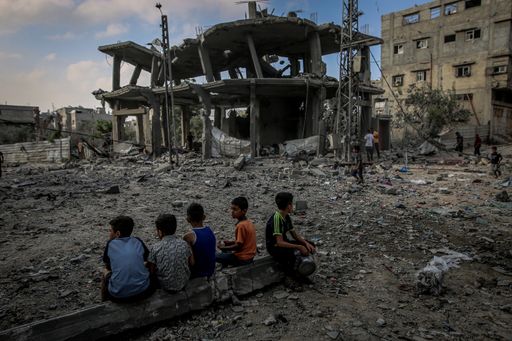On this day, August 25, eight years ago, the Myanmar army launched a campaign of genocidal violence against the Rohingya in their ancestral home in western Myanmar, bordering Bangladesh.
The scorched-earth campaign led to a violent mass eviction of over 740,000 Rohingya in the fall of 2017, while 300 villages were razed in the name of “security clearance operations” against “Muslim terrorists”.
At the time, Myanmar’s civilian government was headed by Aung San Suu Kyi, who officially endorsed the ethnic cleansing and defended it globally, using her high offices as state counsellor and foreign minister.
When the exodus subsided, we both travelled to Cox’s Bazaar in Bangladesh – which now houses one of the world’s largest refugee camps – and met and heard first-hand tales of mass rape, slaughter, arson and violent expulsion from scores of Rohingya survivors.
For the Rohingya, the Myanmar genocide is still ongoing.
They have no rights or protections, nor any real prospect of return – not dissimilar to what the Palestinians are facing in their own homeland.
A global failure
Eight years on, one unmistakable lesson we draw is the pattern of repeated failures of the international system of political states – and its principal judicial organ, the International Court of Justice (ICJ) – to hold the culpable states to account.
This has directly resulted in the conditions of impunity for further crimes in Myanmar. These patterns of impunity also extend beyond Myanmar to other contemporary atrocity crimes.
In Gaza, for instance, a staggering 83 percent of those killed in Israel’s bogus “urban warfare” against Hamas are civilians, according to a leaked Israeli military report.
Myanmar, like Israel, is in the merit phase of its genocide case initiated by Gambia at the ICJ, after the court unanimously determined that the initial evidence of genocide met the court’s standard of plausibility of Myanmar breaching the Genocide Convention in its treatment of the Rohingya.
In January 2020, the ICJ declared 600,000 Rohingya still inside Myanmar a protected group and ordered Yangon to prevent any further violence against the group.
However, since then, the impunity in Myanmar has only increased. In preventing further acts of genocide, the principal judicial organ of the United Nations has categorically failed.
Genocide against the Rohingya is proceeding much faster than the ICJ’s legal proceedings.
Since the coup of 2021, during which the Myanmar military ousted Suu Kyi and her twice-elected civilian government, the junta has been committing war crimes across the length and breadth of the country against other ethnic minorities and anti-coup political opposition.
Meanwhile, as armed conflicts engulf the country, more perpetrators have emerged who target Rohingya civilians.
The Arakan Army, an ethnic Rakhine Buddhist militia that has seized control of large parts of Rakhine state, today stands credibly accused by the UN and international human rights watchdogs of mass slaughter and persecution of those Rohingya who remain in the province.
The Arakan Army’s crimes are reportedly driven by a virulent strain of anti-Islam Buddhist ethno-nationalism.
The Myanmar public, incidentally, has only partially processed the genocide.
While they have pointed fingers at the military as the principal perpetrators against the Rohingya people, they have not properly acknowledged the collaborating roles of political parties, the Buddhist order, the anti-junta ethnic resistance organisations and civil society.

‘Slow-burning genocide’
In our three-year study published in 2014, we warned the international community of the institutionalised nature of Myanmar’s exclusion, persecution and destruction of the Rohingya people.
By slow-burning genocide, we mean a state-led process of intentional destruction of a group – in this case Rohingya - using both violence and national law as instruments of mass murder.
Importantly, genocide is also enabled and facilitated by society at large. In Myanmar’s context, the public has been primed to go along with the Islamophobic ideology behind the military’s persecution of the Rohingya.
When Aung San Suu Kyi, the then a “darling of democracy” in the Western eyes, entered the ICJ as the country’s ‘madam agent’ in 2020, and defended her country against charges of genocide, she not only destroyed the last shreds of her moral authority, but also wrecked the potential for large sections of Myanmar society to come to terms with what it means to be members of a perpetrating society.
In the wake of recent crimes against the Rohingya by the Arakan Army, as the mass graves of 600 slaughtered Rohingya were unearthed, the silences by members of Myanmar’s other armed and political opposition groups weigh very heavily.
Alliances with the Arakan Army are apparently worth more to these resistance organisations than the continuing mass murder, repression and violent deportation of Rohingya people. In the face of an ongoing genocide, silence is complicity.
The Myanmar public has not learned from the downfall of Suu Kyi, in captivity since the coup of 2021, whose active denial cost her the world’s support.
She is facing an arrest warrant in a Pinochet-like case for her active role in Myanmar’s crimes against humanity.
Beyond Myanmar, individual leaders continue to operate with almost complete impunity, unsanctioned by the international justice system.
We have entered a deeply troubling period in human history, during which the Western states that created the post-Holocaust political order and international legal frameworks have discarded any pretence of committing to the values of human rights or genocide prevention.
Instead, the United States lauds Prime Minister Benjamin Netanyahu and sanctions the International Criminal Court officials in response to arrest warrants issued for Israel’s leaders.
Meanwhile, European states such as the UK continue to abuse domestic anti-terrorism laws to punish any citizen opposition against Israel’s ongoing genocide in Gaza and the Jewish supremacist apartheid.




















